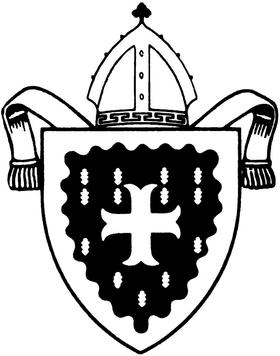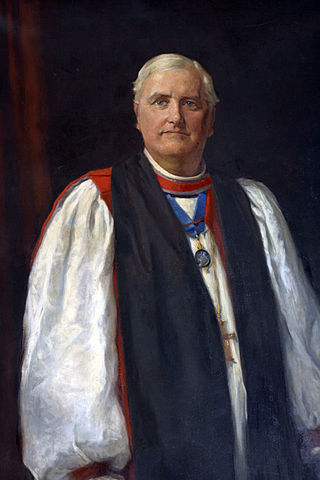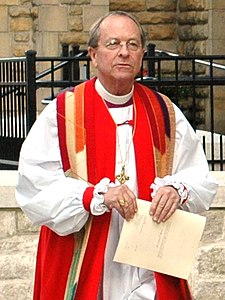
The Anglican Communion is the third largest Christian communion after the Roman Catholic and Eastern Orthodox churches. Founded in 1867 in London, the communion has more than 85 million members within the Church of England and other autocephalous national and regional churches in full communion. The traditional origins of Anglican doctrine are summarised in the Thirty-nine Articles (1571). The archbishop of Canterbury in England acts as a focus of unity, recognised as primus inter pares, but does not exercise authority in Anglican provinces outside of the Church of England. Most, but not all, member churches of the communion are the historic national or regional Anglican churches.

The Anglican Church of Korea is the province of the Anglican Communion in North and South Korea. Founded in 1889, it has over 120 parish and mission churches with a total membership of roughly 65,000 people.
The Bishop of Gibraltar in Europe, commonly known as the Bishop in Europe, is the ordinary of the Church of England's Diocese in Europe in the Province of Canterbury.

The Church of North India (CNI) is the dominant united Protestant church in northern India. It was established on 29 November 1970 by bringing together the Protestant churches working in northern India. It is a province of the worldwide Anglican Communion and a member of the World Methodist Council and the World Communion of Reformed Churches. The merger, which had been in discussions since 1929, came eventually between the Church of India, Pakistan, Burma and Ceylon (Anglican), the United Church of Northern India,, the Methodist Church, Disciples of Christ denominations.

The Anglican Church of Papua New Guinea is a province of the Anglican Communion. It was created in 1977 when the Province of Papua New Guinea became independent from the Province of Queensland in the Church of England in Australia following Papua New Guinea's independence in 1975.
The Ecclesiastical Province of Rupert's Land, founded in 1875, forms one of four ecclesiastical provinces in the Anglican Church of Canada.
The Anglican dioceses of Buganda are the Anglican presence in the Central Region, Uganda ; they are part of the Church of Uganda. The remaining dioceses of the Church are in the areas of Eastern Uganda, of Northern Uganda, of Ankole and Kigezi, and of Rwenzori.
The Anglican Church of Tanzania is a province of the Anglican Communion based in Dodoma. It consists of 28 dioceses headed by their respective bishops. It seceded from the Province of East Africa in 1970, which it shared with Kenya. The current primate and archbishop is Maimbo Mndolwa, enthroned on 20 May 2018.

Frank Theodore Woods was a Church of England bishop. He was the Bishop of Peterborough from 1916 to 1923 before being translated to the See of Winchester, where he remained until his death.
Alwyn Rice Jones was Bishop of St Asaph from 1981 to 1999 and also Archbishop of Wales, the Welsh province of the Anglican Communion, from 1991 to 1999. During Rice Jones' tenure, the Church of Wales reformed its rules in order to ordain women priests, and to allow divorcees to remarry in church.
The Bishop of Edmonton is an episcopal title used by an area bishop of the Church of England Diocese of London in the Province of Canterbury, England. The title takes its name after Edmonton, an area in the North of the London Borough of Enfield; the See was erected under the Suffragans Nomination Act 1888 by Order in Council dated 29 May 1970.
The Bishop of Dorking is an episcopal title used by a suffragan bishop of the Church of England Diocese of Guildford, in the Province of Canterbury, England. The title takes its name from the town of Dorking in Surrey. However, the bishop of Dorking lives in Guildford.

Gregory Kenneth Cameron is a Welsh Anglican bishop. He is Bishop of the Diocese of St Asaph in Wales, having been elected on 5 January 2009 and confirmed as bishop on 16 March 2009.

Michael Arthur Hill is an English Anglican bishop. He was the Bishop of Bristol from 2003 until he retired effective 30 September 2017.
John Gilbert Hindley Baker was a British Anglican bishop who served as Bishop of Hong Kong and Macao from 1966 to 1980.
John William Alexander Howe was an Anglican bishop, who served as the eighth Bishop of St Andrews, Dunkeld and Dunblane, and became the Secretary-General of the Anglican Consultative Council.

Jonathan Michael Goodall is a British Roman Catholic priest and a former Church of England bishop. From 2013 to 2021, he was Bishop of Ebbsfleet, a suffragan bishop who is the provincial episcopal visitor in the western half of the Province of Canterbury for those "within the spectrum of Anglican teaching and tradition" who are "unable to receive the ministry of women as bishops or priests". He was ordained a Catholic priest on 12 March 2022.
The Anglican Bishop of Santiago is a bishop in the Anglican communion, the head of the Anglican Diocese of Santiago within the Anglican Church of Chile. Until 2018, the bishop and diocese were "of Chile", in the Anglican Church of South America.
The Anglican dioceses of Eastern Uganda are the Anglican presence in (roughly) the Eastern Region, Uganda; they are part of the Church of Uganda. The remaining dioceses of the Church are in the areas of Buganda, of Northern Uganda, of Ankole and Kigezi, and of Rwenzori.
The Anglican dioceses of Burundi are the Anglican presence in Burundi; together they form the Province of the Anglican Church of Burundi. The Anglican churches of the area were under the authority of the Archbishop of Canterbury until 1965, when the Province of Uganda and Ruanda-Urundi was created; Burundi was then part of the Province of Rwanda, Burundi, and Boga-Zaire from 1980 until its own church province was erected in 1992.










